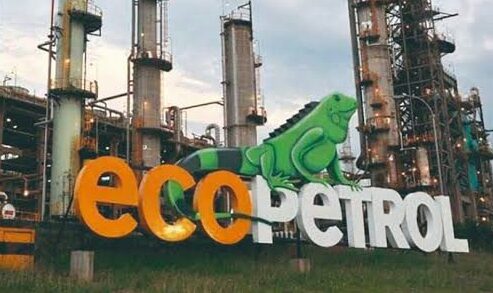Bogotá, Colombia – Ecopetrol, Colombia’s largest state-owned oil company, has taken a hit in the stock market following a JP Morgan decision that could shake investor confidence in the company’s future. On Wednesday, JP Morgan downgraded Ecopetrol’s stock rating from ‘Neutral’ to ‘Underweight’, setting a new target price of $8.50 USD for its American Depositary Receipts (ADR) by December 2024, a steep 30% decline from its previous target of $12.
This move sent shockwaves through the market, causing a sharp 5.15% drop in the company’s stock on the Colombian Stock Exchange, though the stock recovered slightly by week’s end.
Why Ecopetrol’s Stock Is Declining
The downgrade has led to broader questions about the future of Ecopetrol and why, despite relatively stable Brent oil prices between $70 and $90 a barrel, the company is seeing this valuation decline. As Felipe Campos, a senior strategist at Alianza Valores, points out, “It’s unusual for Ecopetrol to be at these price levels with oil prices where they are today. Yet, the company’s ADRs have previously hit $8.50 under the current administration.”
The key issue seems to be a combination of external market factors and internal decision-making that are making investors uneasy. One of JP Morgan’s biggest concerns is the “conflict of agencies” within Ecopetrol—a situation where the company’s management may be acting contrary to the best interests of its shareholders.
The Fracking Dilemma: Conflict Between Corporate Strategy and Government Policy
At the heart of this conflict of agencies is Ecopetrol’s decision to walk away from acquiring a significant stake in CrownRock, a U.S.-based company specializing in fracking operations. This could have expanded Ecopetrol’s production footprint in the U.S., which has been a crucial area of growth for the company since 2019 through its partnership with Occidental Petroleum (Oxy).
However, President Gustavo Petro’s government has been vocal in its opposition to fracking and new hydrocarbon exploration. This political stance was echoed by Ricardo Bonilla, Colombia’s Minister of Finance, who confirmed that the CrownRock deal was not pursued primarily because it involved fracking, a practice increasingly unpopular within the administration.
This decision has raised red flags for investors, sparking fears that government priorities are being placed above corporate growth opportunities. “The government’s stance on fracking and new oil exploration sends mixed signals to the market,” Campos explained. “It raises concerns about the independence of Ecopetrol’s board and whether the company’s strategic objectives are aligned with long-term shareholder value.”
Geopolitical Risks and Operational Challenges
Ecopetrol is also grappling with significant operational risks at home. Ongoing geopolitical instability in Colombia—highlighted by frequent pipeline attacks and transportation disruptions—has strained the company’s capacity to operate efficiently. These events not only affect production targets but also lead to heightened operational costs, further impacting profitability.
Another challenge is the government’s intervention in fuel pricing. Following a recent truckers’ strike, the Colombian government rolled back plans to raise diesel prices, a move that could squeeze Ecopetrol’s cash flow at a time when it needs to invest heavily in both oil production and a longer-term energy transition strategy.
Corporate Governance Under Scrutiny
Ecopetrol’s corporate governance has come under increased scrutiny following the departure of two board members, who resigned amid disagreements over the company’s direction. JP Morgan was quick to cite these resignations as potential evidence of misalignment between the company’s leadership and the expectations of its investors.
Investors and analysts alike are now questioning whether Ecopetrol’s board is truly autonomous, or if it has become too closely aligned with the government’s agenda. Former Finance Minister Juan Camilo Restrepo emphasized that Ecopetrol is not merely an extension of the government. “With over 250,000 private shareholders, the company has responsibilities that go beyond the interests of the administration,” Restrepo stated.
The Path Forward: What Ecopetrol Must Do to Regain Investor Confidence
Looking ahead, Ecopetrol faces a complex set of challenges if it is to regain investor trust. Several strategic moves could help reverse the negative sentiment:
- Clarify Strategic Direction: Investors need clearer communication about how Ecopetrol plans to balance its oil production with the Colombian government’s push for an energy transition. As Juan David Ballén, a director at Casa de Bolsa, put it, “Ecopetrol must outline a more structured path toward a gradual and orderly energy transition.”
- Mitigate Political Influence: To reassure investors, Ecopetrol’s management and board need to demonstrate independence from political agendas. Actions that prioritize long-term growth over short-term political gains will go a long way toward restoring shareholder confidence.
- Reassess Fracking Partnerships: With the Oxy-Ecopetrol fracking partnership set to expire in 2025, it’s crucial for the company to make a clear decision about whether to renew the agreement or shift its focus entirely. The future of Ecopetrol’s U.S. operations could hinge on this decision.
- Manage Operational Risks: In light of ongoing geopolitical instability, Ecopetrol must find ways to manage its exposure to operational disruptions in Colombia. This could involve further investments in infrastructure security or diversifying its production operations geographically.
Conclusion: Will Ecopetrol Rise to the Challenge?
The next 12 months will be critical for Ecopetrol’s stock performance. While the current situation may look bleak, data shows that the company has navigated similar crises in the past, such as the oil price crashes between 2014-2016 and during the COVID-19 pandemic. However, with political pressures mounting and operational risks remaining high, Ecopetrol must take decisive steps to rebuild trust and chart a clear path forward if it hopes to restore its standing among investors.
In the words of former Minister Amylkar Acosta, “The damage may already be done, but how Ecopetrol reacts now will define its future.” Investors will be watching closely.


